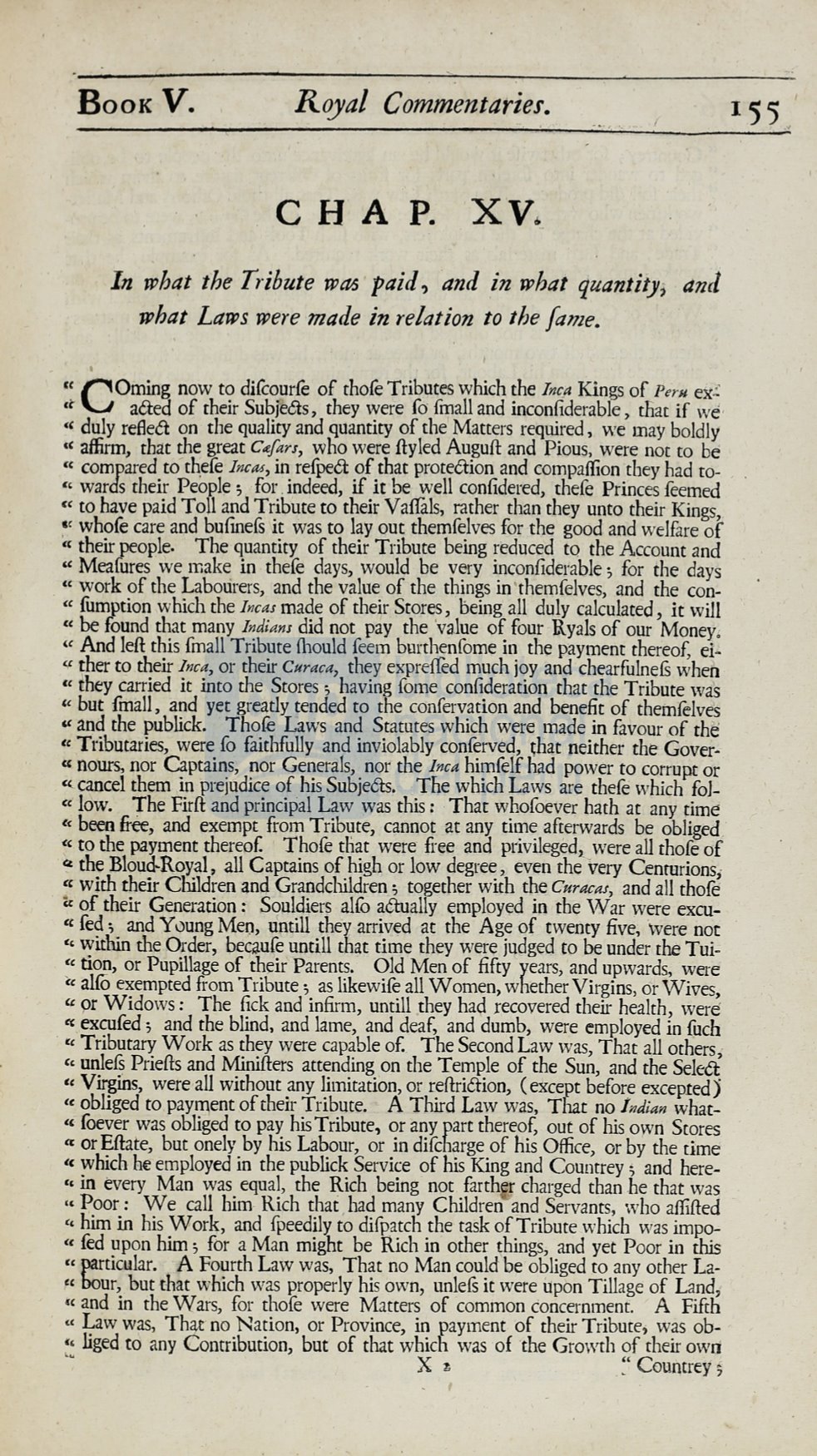

BooK
V.
Royal
Commentaries.
(
.
CH A P.
In
what the Tribute was paid, and ,in what quantiiy;
ami
what Laws were made in relation to the fame.
ce
cOming
now to difcourfe of thofe Tributes which the
Inc..a
Kings of
Peru
ex.:
''"
aél:ed of their Subjeél:s, they were
fo
fmall and inconfiderable, tfiac
if
we·
'' duly refleét on the quality and quantity of che Matters required, we may boldly
,, affirm, thac the great
c~fars,
wl:io were ftyled Auguíl: and Pious, were noc
to
be
" compared cóchefe
lnca,s,
in refpeél: of that proteél:ion and compaffion they had
to–
" wards their Peoplc:
7
for .indeed,
if
it be well confidered, d-iefe Princes feemed
"to
have paid ToU and Tribute to their Vaífals, rather than they unto their Kings,.
" whofe care and bufinefs it was to lay out themfelves for the good and welfare of
'' their people. The quantity of their Tribute being reduced to the Account and
" Meafures we make in thefe days, would be very inconfiderable
7
for che days
" work of the Labolirers, and the value of che things in 'themfelves, and che con–
" fumption which the
Incas
made of their Seores, being all duly calculated, it will
ce
be found that rnany
lndians
did not pay the ·value of four Ryals of our Money,
<e
And leíl: this fmall Tribute fhould feem burchenfome in the payment chereof,
ei–
'·' ther
to
their
Inca,
or their
Curaca,
they expreífed much joy and chearfulnefs when
,e
they carried it into the Stores; having fome confideration tbat che Tribute wa's
,e
but fmall, and yet greatly tended to che confervation and benefit of chemfdve's
" and che publick. Thofe Laws and Scatutes which were made in favour of thé
<e
Tributaries, were fo faichfully and inviolably conferved, ~hat neither the Gover–
" nours, nor Captains, nor Generafs, nor the
Inca
himfeff had power to corrupt or
'<..cancel them in prejudice of his Subjeél:s. Tñe which Laws are thefe which
foJ–
" low. The Firíl: and principal Law was chis: Thac whofoever hath at any
timé
<<
been
fi-ée,
and exempt from Tribute, cannot at any time afterwards be obliged,
" to che payment thereof. Thofe diat were free and pl'ivileged, were all thofe of
c:t
the Bloud--Royal, all Captains of high or low degree, even the·very Cemurions,
ce
with their Children and Grandchildren ; together wich the
Curacas,
and all chofe
«
of their Generation ; Souldiers alfo a&lally employed in che
Vv
ar were excu–
,, fed ; and
Y
0ung Meo, untill they arrived ac the Age of cwenty five, \.vere not
'' within the Order, becaufe untill that
time
they were judged to be under
che
Tui–
" tion, or Pupillage of their Parents. Old Men of fifty years, and upwards, were
'' airo exempted from Tribute ; as likewife all Women, whether Virgins, or Wives,
ce
pr
Widows: The fick and infirm, untill they had recovered their healrh, were
" excufed ; and the blind, and lame, and deaf, and durnb, were employed in fuch
· re
Tribucary Work as they were capable of. The Second Law was, That a.11 ochers;
'' unlefs Priefrs and Miniíl:ers attending on che Temple of the Sun, and the Sek:ét
<e
Virgíns, were,all without any limitation, or reíl:riétion, ( exc_ept befare excepted)
" obliged to pay111ent oftheir Tribute. A Third Law was, That no
Índian
what–
,, foever was obliged to pay his Tribute, or any pare thereof, out of his own Seores
" or Eíl:ate, bue onely by his Labour, or in difcharge of his Office, or by che time
'' which
h€
ernployed in che publick Service of his King avd Councrey
~
and here–
,, in every Man was equal, che Rich being not farth .r charged than .he that was
" Poor : We call him-Rich that ,had many Children and Servants, wbo affiíl:ed
'' him
in
his Work, and fpeedily to difp.arch the task ofTribute which was impo–
" fed upon him ; for a Man might be Rich in other tbings, and yet Poor in chis
" partimlar.
A
Fourth Law was, That no Man could'be obliged co any ocher La–
" bour, but that which was properly bisown, unlefs
it
were Í.:ipon Tillage of Land,
"and in che Wars, for chofe were Matters of common éoncernment. A Fifrh
" Law was, Ths,r
00
Nation, or Province, in payment of their Tribute; was ob–
,, liged
to
any Contribution, but of that which was of 1he Growth of rheir owri
º"
X
~
~'
Councrey
~














